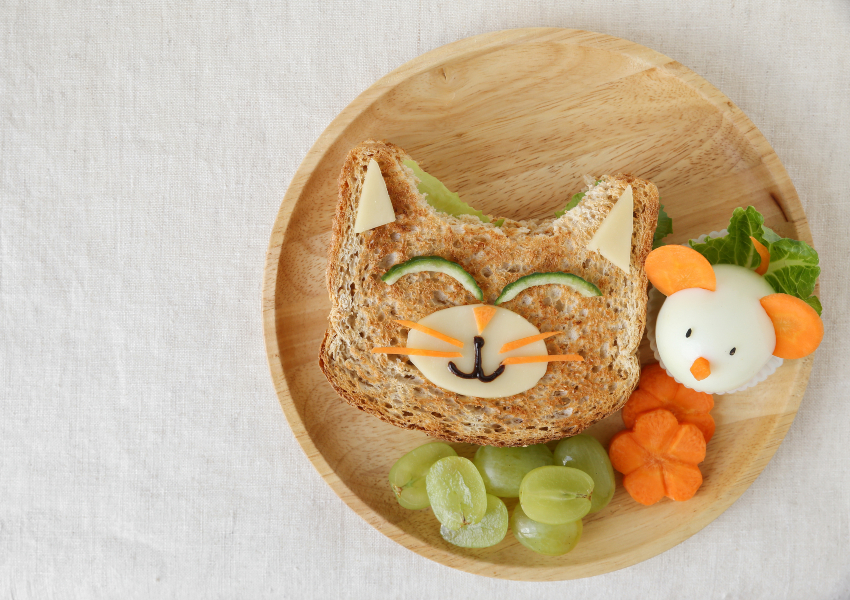
When children are incredibly particular about the food they’ll eat, or they seemingly refuse to eat anything at all, they’re certainly not alone. In a study shared by the US National Library of Medicine, picky eating is described as a "common disorder during childhood often causing considerable parental anxiety.” The study found that “at any given age between 13% and 22% of the children were reported to be picky eaters.”
While picky eating is usually a temporary stage that most children grow out of, the study also found that some kids have “a chronic problem [that has] a duration of more than 2-years.” If your child’s refusal to eat is ongoing, and you have concerns that it might affect your child's health, then you should definitely consult your doctor as soon as possible. However, for little ones who are just starting to balk at dinner or have been for a few days or weeks, then here are 11 of the best ways to break those kids out of being picky eaters.
Get Your Child Involved

Children might be more likely to eat the food you put in front of them if they’re involved in the overall process. Let your child make some choices when you write up your grocery list each week, and have her help you prepare both meals and snacks. That way she’ll be excited to try her own creations.
Set a Good Example

While many of us are often too busy to eat a good meal, it’s important to set a good example if we expect our children to eat properly. Make sure that you take the time to sit down with your family as often as possible. If your child sees you eating a full plate of nutritious food, he’ll be more likely to follow your lead. If your little one sees you skipping meals and eating only certain foods, then he might pick up your bad habits.
Stick to Regular Mealtimes

Our busy lives can also make it difficult to ensure that we’re eating at the exact same time every day. However, sticking as closely as possible to regular mealtimes (and even snack times) can help children's bodies get on a routine so that they’ll be ready and eager to eat when breakfast, lunch, and dinner roll around.
Keep Mealtimes Relaxed, Happy, and Fun

When you sit down to have a meal with your family, try to keep it relaxed and happy, even if you happen to be frustrated by your little one’s resistance to eating. Your child may not want to touch the meal if the mood around the table is tense and unpleasant. And while you want to make sure that your child is learning proper table manners, don’t be overly strict while dealing with a picky eater. Instead, let your kid first learn to enjoy mealtime, even if that means being a little silly and playing with the food (for now).
Eliminate Distractions

Mealtime should be fun, but you also don’t want there to be too many distractions. For instance, you may want to let your child bring a toy to the table if it puts her in a good mood, but if your little one plays with the toy instead of eating, then you might need to ask her to put it aside until she's done.
You may also want to make sure the television is off and that there aren’t too many conversations happening at once. Make sure your child isn’t overstimulated, and even try drawing her attention to her food by talking about how lovely it looks and how delicious it is.
Make Attractive Meals

While adults may think that all meals look appetizing if they’re prepared properly, children aren’t always as charmed by straightforward food. However, kids tend to be thrilled and tempted to dig in if their dinner is plated in a certain way. Take a few extra minutes to make some adorably appetizing meals that resemble animals, silly shapes, or other fun designs, and you might see a big smile on your kid’s face just before he starts stuffing his mouth.
Don’t Make Separate Meals

While parents might be tempted to make children a separate meal if they’re unlikely to eat what the rest of the family plans to have, that’s not something that you want to do on a regular basis. Not only will you end up overwhelming yourself with extra work, but you also won’t be helping your child explore new foods and possibly learn to enjoy other dishes.
Understand That Some Children Might Taste Things Differently

You don’t want to be making a separate meal for your child each night, but you might want to adjust her dish to suit her particular tastes. In the same way that adults prefer to add seasoning or sauce to their preference, your child might also prefer food a certain way. “In general, children are hardwired to like sweeter flavors,” dietitian Angela Lemond tells WebMD. “Because they’re growing so quickly, they naturally want higher-calorie foods.”
Listen to Your Child

This might be one of those times when you need to stop telling your child what to do and listen to him instead. There could be plenty of reasons why your child is being picky about food. Certain things might freak him out or upset his stomach. Frankly, your little one may simply not be hungry — snacks can fill up children more than you’d expect, which means that they won’t want or need more food when it’s dinnertime.
Children also go through different stages when they require different amounts of food, and their appetites can reflect those needs. If your child tells you he doesn't want to eat, that may be because he's all filled up.
Understand a Need for Independence

Children's refusal to eat when they are told to might not be related to food at all but may instead be their way of attempting to assert their independence as they get older. In this case, show your child how she can take control of certain aspects of her meals and nutrition. “You can discuss the benefits of certain foods,” Angela Lemond, who’s both a dietitian and parent, tells WebMD. “With my son, I explained how eating broccoli could help him with his goal of being a good soccer player.”
Be Patient and Persistent

The best thing you can do if your child is a picky eater is to be both patient and persistent. Getting angry or acting like you’re disappointed in your kids will only make them feel bad and want to avoid the situation (i.e., eating) even more. You also don’t want to pressure or try to trick your child. This can create resentment and distrust, which will make things even worse in both the short term and the long run.

According to the Mayo Clinic, “If your child isn't hungry, don't force a meal or snack. Likewise, don't bribe or force your child to eat certain foods or clean his or her plate. This might only ignite — or reinforce — a power struggle over food. In addition, your child might come to associate mealtime with anxiety and frustration or become less sensitive to his or her own hunger and fullness cues.”




